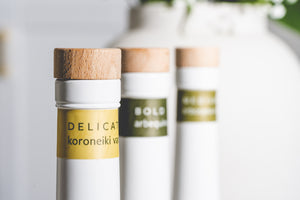Shopping for olive oil can feel like a daunting task: between the various labels, confusing terminology, and such a wide price range, it’s no surprise that consumers can be left questioning: what really matters when it comes to olive oil and is it really worth the investment? We’ve spent a lot of time thinking about these questions in the process of developing our olive oil. And in doing so, we’ve broken down some helpful information below to help guide you through the olive oil selection process.
- Extra Virgin Only: When it comes to comparing olive oil, one of the easiest first steps you can take to ensure you are purchasing a quality product is to make sure the bottle is labeled as “extra virgin”. It might seem obvious but the olive oil market is vast and a lot of manufacturers try to deceive customers by using vague language that might imply a bottle is extra-virgin without actually going through the rigorous classification process. Some could use words like “light” or “low fat” or “pure” but more often than not, these are just marketing gimmicks. Simply finding the words “extra virgin” on a bottle means you are likely eliminating a lot of inferior products out there.
- Look for Certification Seals: The olive oil certification process is timely and rigorous. If a producer has gone through the extra effort of getting the certification, they’ll definitely want you to know about it. Here at aficio22, our bottles have the “COOC Certified Extra Virgin” seal from the California Olive Oil Council for California-made oils.
- Harvest Date > Best By or Bottled Dates: Some experts claim that the ‘best by’ date or the ‘bottled on’ date are less important when purchasing oil. After all, the 'best by' date can be arbitrary and doesn’t have much legal standard. Moreover, the 'bottled on' date could also be deceptive as the oil could’ve been stored in a tank for a long time before it was bottled. Instead, it’s more important for you to pay attention to the ‘harvest’ or ‘pressed on’ date. This information is important because EVOO has a shelf life of around 2 years after the harvest date.
- Specifics that Matter: Artisanal olive oil sellers are proud of the work and research that goes into crafting their product. Apart from the harvest date, if they provide other details such as the name of the producer or estate where it was made, chances are you are purchasing a genuine product.
- Bottle Design Can Make a Difference: Exposure to light, air, and heat can damage your olive oil and cause it to go rancid sooner than expected. Opaque bottles help to keep the light out during transport and storage. Therefore, you should always avoid purchasing oil that comes in a clear or plastic container. This is just one of the extra steps we took at aficio22 to ensure you are able to enjoy your oil to its maximum potential.
- Trust Your Senses! In the end, you should always trust your senses when it comes to determining quality and value. Fake olive oil can taste greasy or flavorless while real olive oil should taste bright or earthy.
You can always trust aficio22 to focus on all the right details to ensure you are always receiving the best EVOO. Shop our latest batches of olive oil by visiting our online shop.
Do you have any questions or additional tips related to selecting olive oil? Leave us a comment below!

